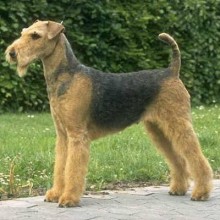Airedale Terrier
Lifestyle Needs

The Airedale Terrier is a medium size dog and the largest of all the Terriers. He is usually a good tracking dog and will love any activity where he can use this skill. He is suitable as a family dog, and can be protective of his family. He is best suited to live in a house with a garden and be given plenty of opportunity to run free. His double, wiry coat is waterproof and will need to be groomed every day. He sheds his coat twice a year and at those times should be professionally clipped.
Genetic Diversity
(Known as Coefficient of Inbreeding: 'COI'. It should be as low as possible.)
The UK Kennel Club breed average COI is 17.3% - See 'A Beginners Guide to COI'
Gene Pool Size
(Known as Effective Population Size: 'EPS')
25.6
EPS is a measure of how many individuals are contributing genetically to a breed population. It is a measure of the size of the gene pool in a breed. Lower than 100 is considered critical by conservationists and below 50 brings a breed close to extinction. For more information see the Kennel Club article.
Health and Welfare Problems due to Conformation
(Body shape and physical characteristics)
- Gastric dilatation volvulus (Bloat/Torsion)
BVA/KC Health Schemes: www.bva.co.uk/chs
- Hip dysplasia: breed mean score 13.3 (parents should be lower)
Estimated Breeding Values (EBVs) : EBVs for Hip Dysplasia are available for this breed
www.thekennelclub.org.uk/about-ebvs
DNA Tests Available
DogWellNet and IPFD Harmonisation of Genetic Testing for Dogs (HGTD)
www.dogwellnet.com/breeds
- Factor V11 deficiency
- Haemophilia B (Factor 1X deficiency)
- Protein Losing Nephropathy (NPHS 1)
- Degenerative myleopathy
Availability of a DNA test does not mean that it is always necessary or even desirable for breeders to use this test.
Other Breed-Specific Health Screening Schemes
- Bitches under 2 years not to be mated
- Bitches over 6 years not to produce a litter
Ask the breeder to show you the certificates for the above tests/screening for both parents. If any of the above tests have not been considered necessary by the breeder (and there may be good reasons), ask her to explain why.
Other Diseases Reported
(For which there are currently no genetic or screening tests for sire or dam)
- Heart disease: Dilated cardiomyopathy
- Hypothyroidism
- Haemophilia B
- von Willebrand’s disease (vWD)
- Cancer: bladder and urethral tumours; nasal cavity tumours; Lymphoma
Ask the breeder about the medical history of the parents, grandparents and great grandparents. Consider carefully whether to purchase a puppy if some of these or other diseases are in the family line.
Ask about the breeder’s policy in cases of serious genetic diseases occurring to your puppy in later life. Good breeders will request to be informed of such events in order to improve future breeding decisions.
You are strongly advised to buy from a breeder who uses (or is prepared to use) the AWF Puppy Contract and Puppy Information Pack (PIP): www.puppycontract.org.uk
The breeder should also be familiar with the CFSG/DBRG Code of Practice for Dog Breeding